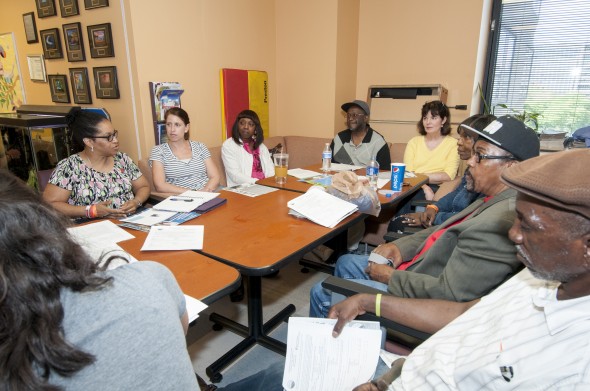Like a family, support group offers encouragement after stroke

The Living after Stroke support group meets twice a month. “We are champions, not survivors,” says Marshelle Samuels (left), the support group’s co-facilitator.
Upbeat music, plates of cake and smiling faces filled the 5 East Dayroom in the UI Hospital. A celebration was in the works: the Stroke Champion Welcome Back Party.
The annual party for former inpatients, hosted by the UI Rehabilitation Unit and the Living after Stroke support group, acknowledges the long road to recovery that patients have undergone.
“When you’ve had a stroke, you can’t really see past that day,” said the support group’s co-facilitator, Marshelle Samuels, 57, of Oak Park, a volunteer at Chicago Cares and the Broadview Missionary Baptist Church.
“You can’t really believe that you’ll walk again, that maybe you’ll talk again. The group provides encouragement and motivation for those who attend to continue along their recovery path.
“We are champions, not survivors,” she added.
“‘Survivors’ sounds like we’re hanging off a ledge, but each day we achieve something. We get up and seize the opportunities that come our way.”
The group meets from 4 to 5 p.m. on the first and third Tuesdays of each month. There are usually five to 15 members at each meeting, and more are always welcome.
“Each of us brings a uniqueness to the group because we all have different perspectives,” said Samuels. “We all can contribute in some kind of way to someone else’s stroke recovery.”
The support group includes a range of ages, circumstances and different levels of recovery.
Harry Jordan, 38, of Rogers Park, a life coach and volunteer at the UI Hospital, is the group’s other co-facilitator. Jordan had a stroke six years ago during the last of multiple brain surgeries. “I’m the one in the group that can honestly say, ‘I’ve been through it all,’” he said.
A stroke occurs when blood flow to a part of the brain stops, leading to a halt in blood and oxygen intake. It can affect mobility, sight, speech and thought.
“When you say the word ‘stroke,’ there is automatically a certain kind of stigmatism as far as how survivors look,” Jordan said.
Since his stroke, Jordan has become a bodybuilder. “One of the reasons why I wanted to do this group was to say, ‘Look at me, I’ve had a stroke, but I don’t have to fall into what society thinks I’ll look like,’” he said.
The group welcomes family members and friends to meetings, to help them cope with the new changes found in their loved ones.
“I had a friend say this to me shortly after my stroke: ‘The stroke did not just happen to you, it happened to the people that care about you,'” said Samuels. “That was very eye-opening.”
The group began three years ago when Samuels and Jordan were approached by Aileen Eviota, UI Hospital physical therapist inpatient coordinator. “There was a lack of services after stroke patients were discharged from the hospital,” Eviota said.
Eviota knew Samuels and Jordan from their time as patients and thought they would make a good team.
“The experiences that other people have had with stroke groups was that, they didn’t like the white coats, and that it was more lecture-based,” she said. “They wanted something more for themselves.”
The group discusses diet, exercise, nutrition and available resources. More importantly, the members share stories.
“We know the walk. We know how it feels,” said Celina Orozco, 55, a Pilsen resident and facilitator of training at Be Strong Families. “It’s like a family besides your own family.”
For more information about the Living after Stroke group, contact Eviota, 312-996-0525 or aeviot1@uic.edu
